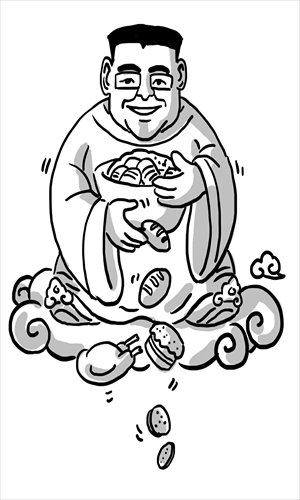HOME >> OP-ED
Wealth should result in smarter charity
By Rong Xiaoqing Source:Global Times Published: 2014-7-3 19:18:01

Illustration: Liu Rui/GT
In his short story "The Rich Boy," Scott Fitzgerald said matter-of-factly: "Let me tell you about the very rich. They are different from you and me." Ernest Hemingway, Fitzgerald's friend, reportedly responded: "Yes, they have more money." That was decades ago. But the conversation has been resonating up until today, with its connotations transforming with time.The last time I thought about the words was on June 25, when Chinese billionaire Chen Guangbiao came to New York and treated 250 or so local homeless people to lunch at the fancy Loeb Boathouse in Central Park.
Despite a couple of dozen Chinese who lined up in front of the restaurant to protest against all sorts of things that morning, the event got off to a happy start. The homeless - many of whom apparently had tried to dress up for this rare occasion - and the volunteers who, as Chen required, were clad in People's Liberation Army-style uniforms, the three-course hearty meal of salmon salad, steak and berry tarts, and the songs and magic tricks Chen performed for the diners himself, all made it an oddly matched pleasant scene.
But when the homeless people walked out of the restaurant, they were not happy. Some called Chen a liar. One of the grumpiest told me: "Who cares about the food? In New York, you can get free food everywhere. We came here for the money."
The money was $300 in cash Chen promised to distribute to each of them after the lunch. That is what he promised in an advertisement he placed in The New York Times for the event. That was indeed Chen's plan until he was persuaded by a local homeless services organization who helped him recruit homeless people for the lunch that handing out cash to them was not a good idea. Chen instead gave $90,000 to the organization who will use the money to serve food to 500 people for a month.
That didn't go down so well with the homeless. They held a protest in front of the charity's offices in the afternoon to demand their money.
Anyone who spends their own money on helping the neediest might hope for better. It is not the first time that Chen has been mocked. He often does similar stunts in China. And every time he gains a high profile in such an outlandish way, he triggers waves of negative comments.
But what Chen got wrong was that he adopted a way of giving that doesn't suit him. There are two fables talked about by some in social services that are relevant. One is about a person who saw babies floating in a river one after another. Many people on the banks were trying to pull the babies out. But he ignored them and walked further up stream. Some people blamed him for being heartless. But he wanted to go to the origins of the river to find out where the babies were coming from and to solve the problem at its roots.
The other is about a person saw hundreds of thousands of starfish dying on the beach. Other people were shaking their heads because they felt there were too many starfish and they were not powerful enough to rescue all of them. But he picked up one and threw it back to the ocean. And he said: "At least I saved the life of this one."
These two different approaches are both necessary to build a better world. But, not everyone can use either approach. With limited resources, ordinary people may not be able to solve the problem systematically. But philanthropists like Bill Gates and Warren Buffet are equipped with enough resources. So they have been working at the origins of the river.
Both Chen's assets and his passion for giving place him in the same category as Gates and Buffet. But his mind-set drags him back, so he chose to give in the same rudimentary way as ordinary people do. And the mismatch is destined to create a mess.
If Chen is determined to differentiate himself from the snobbish class and wants to stay close to where he came from, he has many other ways to do so. But philanthropy happens to be one of the very few fields that the rich should be "different from you and me." It's more about effectively allocating resources than reaffirming one's social status.
The author is a New York-based journalist. rong_xiaoqing@hotmail.com
Posted in: Columnists, Viewpoint, Rong Xiaoqing